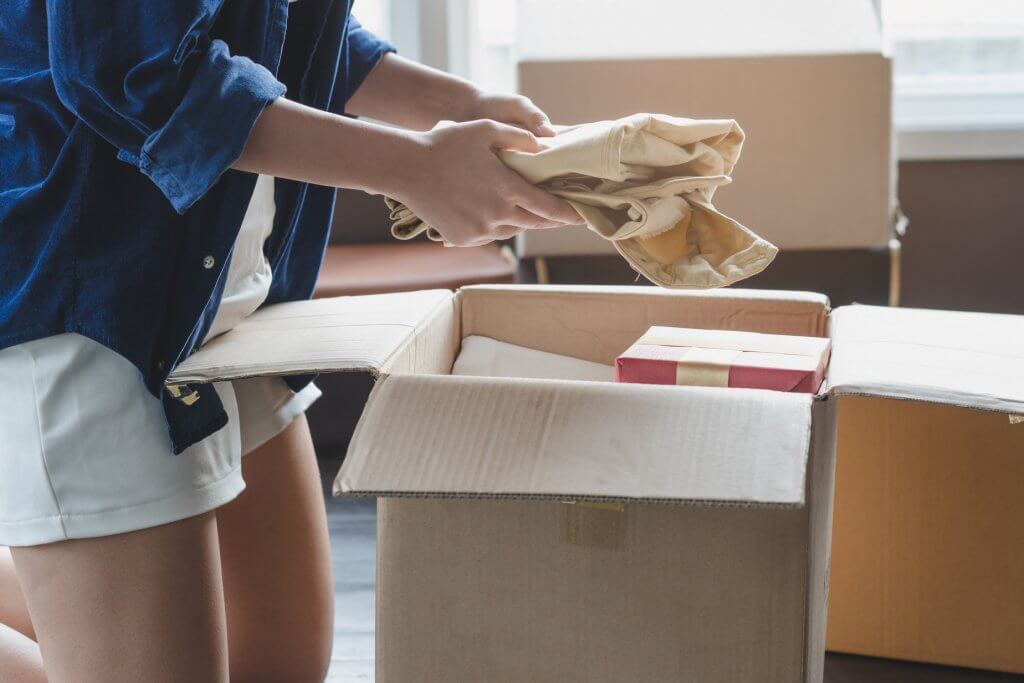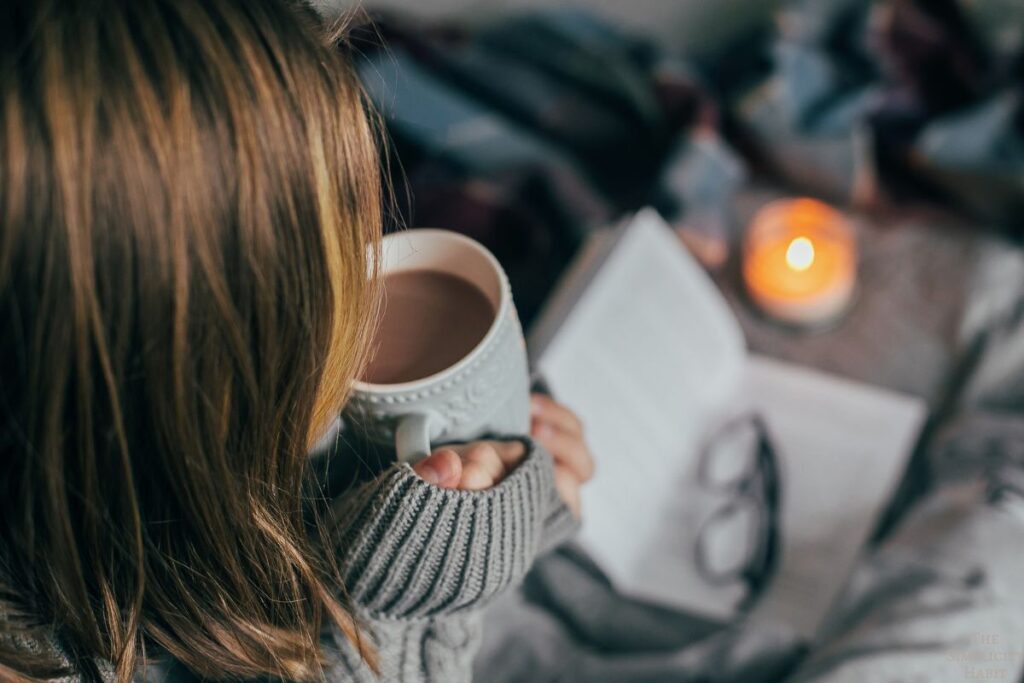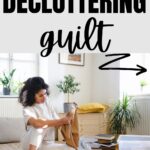Inside: Has decluttering guilt slowed the progress you could be making? Learn how to let it go so you can make more progress with decluttering right away.
Have you ever tried to get rid of unneeded stuff in your home – only to find it incredibly difficult to actually part with?
You aren’t alone.
Many of us feel a sense of guilt when going through our belongings and trying to get rid of stuff we no longer need, despite the fact that we know we’re doing something necessary.
Decluttering isn’t easy to begin with – and the hardest part of the whole process can be the act of actually saying goodbye to the stuff we own.
But why? Why do we experience this sense of decluttering guilt? And how can we overcome this feeling and declutter without guilt?
There’s no one-size-fits-all answer, but a few different possibilities to explore. Join me as we consider the reasons behind decluttering guilt and find ways to get past them and make more progress.

Why do we experience decluttering guilt?
It’s common to experience a sense of guilt or loss when decluttering. After all, you’re saying goodbye to your personal possessions that have been part of your life in some way.
There are a few different reasons we can experience decluttering guilt. Some struggle with decluttering guilt because they feel like they’re throwing away the hard-earned money they spent on it in the first place.
Others feel guilty when decluttering because the items they’re getting rid of hold some sentimental value – not enough to justify keeping the stuff for sentiment alone, but enough to hesitate when getting rid of it.
And others can’t bear the idea of decluttering because they worry they’ll be filled with regret once they’ve actually parted with their old items.
Whether you feel one of these reasons strongly, can relate to a couple of them, or your decluttering guilt is coming from some other place, this feeling is slowing down your progress.
Guilt is not a great reason to hold onto things. Once you’re able to let it go you can regain control of your space and enjoy the things you love and use.

How to get rid of decluttering guilt – and say goodbye to the clutter in your life.
Ready to kick your clutter – and your decluttering guilt – to the curb? Here are a few steps you can take to help yourself let go of decluttering guilt and get rid of the stuff in your life that you no longer need.
1. Whenever possible, keep your clutter out of the landfill.
By giving new life to your old stuff and doing your best to keep it out of a landfill, you can feel much better about the idea of parting with your belongings.
In many cases, our clutter isn’t bad, defective, or at the end of its life – it’s just stuff we no longer need personally.
You’ve heard the saying – one man’s trash is another man’s treasure.
Unwanted pots and pans, books you’ll never read again, decor pieces that no longer fit with your aesthetic, and clothes that no longer fit are great candidates for passing along to someone who would put them to good use.
If you could benefit from a little extra cash and don’t mind putting in the additional time and effort, consider hosting a yard sale or selling your clutter on Facebook Marketplace, Craigslist, or another platform.
You may not earn back all the cash you spent on it in the first place, but it might lessen the blow of saying goodbye to stuff you bought with your own hard-earned money.
Alternatively, you can take the charitable route. You can responsibly donate your clutter to a variety of organizations that support people in need, or leverage your social network and your Buy Nothing group to find folks to support directly.
Knowing that your unneeded clutter is benefiting someone else is a great way to feel better about parting with your stuff.

2. Stop thinking you need to keep things around “just in case.”
Many of us use the “just in case” excuse to keep all kinds of things we don’t really need. This includes obvious stuff like random cords and chargers from all kinds of electronics accumulated over the years or manuals you haven’t touched in ages.
But it also includes all of that backup stuff you hold onto – coats and clothes you’ve outgrown and replaced, tents and outdoor gear you’ve upgraded, old computer monitors and other needless electronics, and so much more.
The fact of the matter is, you probably don’t have a need to keep the majority of the things you’re holding onto for someday.
Breathe a sigh of relief in the fact that you have other things you are already using and enjoying and know that those items weren’t serving you anyway.
Regain valuable space in your home by letting them go and focus on embracing the life you are living now instead of worrying about what-if scenarios.

3. Remind yourself why you’re getting rid of it in the first place.
While it can be hard to part with our stuff, one way to overcome the feelings that complicate the process is to think about the reasons you’ve been keeping things and why you’re decluttering.
Maybe it’s something you no longer want or need – something that’s been collecting dust and taking up space for far too long.
Maybe it’s something you bought but never actually wore or used – or something you’ve gotten more than enough use out of.
Or maybe you simply don’t have the space to hold onto so much stuff.
Whether the items were a gift that wasn’t a great fit for you, something you inherited from a family member who is now gone, or something you wish you hadn’t bought in the first place, it’s important to keep your mind focused on the end goal for your home.
The things you own are meant to benefit you, not burden you. Remembering why you’re simplifying can help you to part ways with your stuff and overcome decluttering guilt.

4. Think about the benefits decluttering will bring.
Another great way to overcome decluttering guilt is to think about all of the benefits you’ll experience from decluttering your home. It might sound dramatic, but it’s true.
You’ll gain more than you realize after you declutter your space and get your home organized.
Clutter has a surprising impact on our mental well-being. Simply existing in a cluttered space can leave us feeling stressed, unable to focus, on edge, and irritable.
Clutter can stifle our creativity and inhibit our ability to relax. And it can have a real, physical impact as well. The sheer amount of dust that can accumulate in your space can have a negative effect on your physical well-being.
Clutter doesn’t positively impact your life in any way. It weighs us down and makes it difficult to thrive. It’s hard to enjoy your space when it causes you stress and anxiety.
By focusing on the things you’re going to gain by clearing the clutter out of your space, you can help shake off that sense of guilt and move forward with confidence.

Letting go of decluttering guilt
Learning to let go of decluttering guilt is a process. It might feel challenging at first but will become easier with practice.
Remember that guilt is not a good reason to hold onto things that you don’t love or use and that are no longer serving you.
Carrying guilt around with you leads to emotional clutter. But using the tips in this post will help you to let go of decluttering guilt and release your worries as well as your unneeded stuff.
When you’re decluttering, how do YOU get rid of guilty feelings? Leave a comment and let me know!
Sign up on the form below to get weekly decluttering tips sent straight to your inbox. You’ll also get the free Your Home Decluttered Jumpstart which includes 100 easy items to declutter and 12 high-impact areas to declutter in 10 minutes.


Thank you for this article, perfect timing as I just threw out a large kitchen garbage bag filled with items I no longer use in my bathroom. I hope to do more, but did have a twinge of guilt last night. So this article was a good little reminder of why I did all that in the first place.
Recovering from a stroke, I decided to try to declutter in very small ways. Going through the bathroom cupboard revealed an extraordinary collection of hand lotion and creams large and small. some had separated and got thrown out. But I put the rest into a basket, shared some of them and am using up the rest. Slowly, the large cupboard has become organised and devoid of junk.
So this has been my policy for now. A drawerful of tangled underwear has been pruned and brought to order. My t-shirts are ranged in neatly folded rows. The pens all over the house – many don’t work! have been weeded out and put in a box. I have a working pen in every hand bag.
They are small changes, but I am filled with a sense of achievement. The kitchen took me 3 weeks to do. A shelf at a time, a drawer at a time. But they have stayed tidy… how can I let such pristine tidiness get all messed up again!
Excellent tips! When I decluter I always feel guilt, but I try to think that the old stuff does not allow the entry of the new stuff! And always release this uncomfortable feeling!☺️
Try to donate if at all possible. You had good use of the things you have, now give with a warm heart. Do NOT donate that which you would not want yourself. Examples: broken, missing parts, too “used”etc. The items that you are getting rid of probably don’t owe you anything. ✅😊
My guilt is usually about getting rid of something that was someone else’s in my family (a deceased parent or grandparent, usually). It has taken me a long time to recognize that the object served its purpose for that person. It doesn’t mean it’s for me and I need to force joy or appreciation out of it.
When I was trying to declutter some things with sentimental value, I took photos of the items. I think it was the reminder of some family member or good experience I did not want to lose, so the photos could be the reminder instead of the objects.
I blame Toy Story for making me think my inanimate objects come to life, and have real thoughts and emotions lol.
I helped someone with this by clearing items as a duo or group, so they each had friends to go on their next adventure (aka new owner) with. Even more items were cleared by each one needing a friend to go along.
I have the biggest problem discarding old photos… particularly of the children when they were growing up. Does anyone have any tips on keeping “snapshots “ of time rather than 20+ albums that take up 3 cabinets ( and they’re rarely looked at!)
I carry a zip drive of photos and have put a backup in my safe deposit box. The process of scanning them goes really quickly once you get it down. I usually set myself 15 minute sessions to scan them. God forbid my house burns down while I am away, I still have my photos with me. My brother scanned the oldest family photos of grandparents, greats, cousins, etc. and put them in a Dropbox account, then emailed all the family members the password so they could go in an view, download or print those photos they wanted. I hope to do this in the coming year for my kids.
How do you scan them? Just use phone app? Or individually scan in a scanner? I have so many photos to deal with too!!!! I’ve inherited even more !!!!
Letting go of sentimental objects does not negate the memories. I once sold a very old stuffed doll from my childhood (1960s) at a garage sale. I took a pic of the doll beforehand and I see her occasionally when going thru the digital photos. A lady bought her for her mother who had a doll collection. Maybe this lady found some joy in this doll (before deciding that she needs to de putter)
After a few years of challenging myself to get rid of 365 things a year = one per day [even items as small as a dried up ink pen count: WHY do we throw these back in a drawer when we know they don’t work???] and either tossing, selling or donating, and getting rid of one like item for every ‘new’ one brought home [2 out for 1 in with clothing] I have learned to not hold on to things I no longer use/wear, have become more disciplined in shopping habits [do I want this ‘new’ item badly enough to have to give up something else?] and I have learned to revel in the JOY of an organised closet without clothing squashed in, NOT having to rotate clothes OR coats every season [they ALL fit AND we can hang guest jackets IN the front closet not throw them on a bed or a chair ], not having dishes and cookware stacked and wedged in cabinets, but all in their own easily viewed and accessed space, and having far fewer tchotchkes to dust [limit 3 items on almost every flat surface]. No more “I’ll use/repair/gift/need this someday.” . No guilt about it. As “Jill” said: some items need to go off on their next adventure. If they no longer really serve a purpose for you, they can for someone else. And creating SPACE for yourself just FEELS better than ‘stuff’